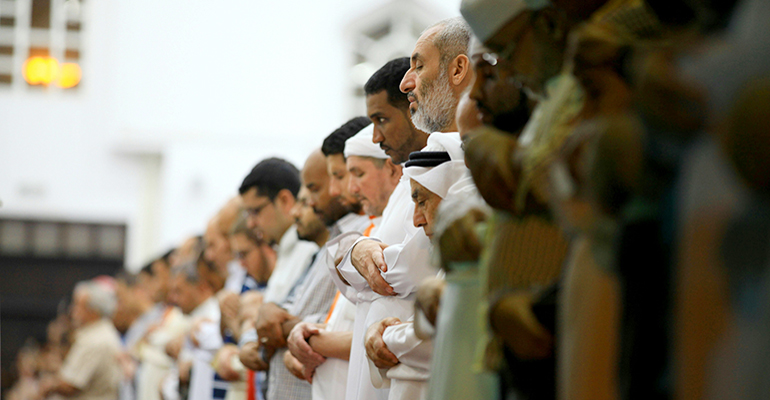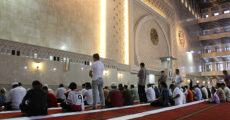Visit our YouTube channel for more
Shaykh Ibn ‘Uthaymeen said:
All Praise is due to Allaah [alone], Lord of the Worlds, and I send prayers and salutations upon our Prophet Muhammad, and his family, and his companions, and those who follow them in righteousness until the Day of Judgment.
The people of knowledge رحمه الله are in agreement that the congregational prayer is one of the best forms of worship and the greatest acts of obedience, and that whoever neglects it or abandons it is severely deprived, severely deprived of the reward that the Prophet ﷺ stipulated for the congregational prayer.
And it has been reported from him ﷺ that:
«The congregational prayer is 27 times better than praying alone.» – al-Bukhaaree, no.619 and Muslim, no.650Prayer with the congregation is obligatory, and a person sins by abandoning it.
It is an obligation indicated by the Book of Allaah, and the Sunnah of His Messenger ﷺ
As for the Book of Allaah, then Allaah (Subhaanahu wa Ta’aala) commanded His Prophet ﷺ – if he was with his companions on a military expedition, to lead them in prayer.
Rather, he commanded his companions to also stand [in prayer] with him, saying:
﴾And when you are among them and lead them in prayer, let a group of them stand [in prayer] with you and let them carry their arms. And when they have prostrated, let them be [in position] behind you and have the other group come forward which has not [yet] prayed and let them pray with you, taking precaution and carrying their arms.﴿ – 004:102This verse indicates the obligation of the congregational prayer, as Allaah (Subhaanahu wa Ta’aala) says:
﴾Let a party of them stand with you﴿ – 004:102Let a group of them stand [in prayer] with you and that it is an individual obligation and not a communal obligation, as He says:
﴾and have the other group come forward which has not [yet] prayed and let them pray with you﴿ – 004:102And if it were a communal obligation, the first group would have been sufficient.
This indicates the obligation also from the point of view that this prayer in this manner disrupts the order of the prayer and following the imaam, [as it is] the prayer of fear and it was mentioned in various ways, all of which contradict the general rules of prayer, which indicates the necessity of congregational prayer even if these general rules were disrupted.
As for the Sunnah, the Prophet ﷺ said:
«I thought to give orders for arranging prayer in congregation, and then to have the iqaamah called for it, then to order a man to lead the people in prayer, then to go off in the company of the men who have bundles of firewood to those people who are not present at the prayer and then to burn down their houses with fire.» – Abu Daawood, no.548. Classified as saheeh by al-Albaanee.The Prophet ﷺ did not intend this punishment except to emphasise the necessity of the congregational prayer.
As for the saying of some that they were about to do it but did not do it, if we were to follow it, this would not have happened. The hadeeth has a meaning and it would not have been useless to say it, because if the Prophet ﷺ had not wanted to warn his ummah against staying away from the congregational prayer, he would not have said this in this context.
Then it is also proven that a man asked him to excuse him – or to give him permission to not attend the congregational prayer because he was a blind man, so he permitted him [to pray at home]. So when he turned [to leave], he called him [back] and said to him:
«Do you hear the call [to prayer]?»
He said: “Yes.”
He ﷺ said:
«Then respond to it [and go to the masjid].» – Saheeh Muslim, no.653
If the congregational prayer was not obligatory, the Prophet ﷺ would not have obligated this blind man with it.
It is also mentioned in a hadeeth that whoever hears the call to prayer and does not respond, then his prayer is invalid unless he has a [valid] excuse.
For this reason, some scholars, including Shaykh al-Islaam Ibn Taymiyyah, held that congregational prayer is a condition for the validity of the prayer, and whoever prays alone without an excuse then his prayer is invalid, just like someone who prays without wudhoo.
So it is obligatory upon the Muslim to uphold this obligation and to pray with the congregation the Fajr, Zhuhr, ‘Asr, Maghrib, and ’Ishaa, and not to miss them.
And this man – as in the question – missed the Fajr prayer, and many prayers [in congregation], then we advise him to fear Allaah in himself, and to abandon this laziness.
And if he accustoms himself to strength, activeness, and determination, then he will attain what is required of him, and [will] overcome his laziness, and his attendance at the congregational prayer will be as if he was raised upon it.
And [as for] his absence from the congregational prayer, [then it] will [be a means for him] experiencing tightness in his chest and being unsettled.
Translation originally published on 1 May, 2025



